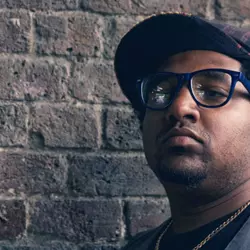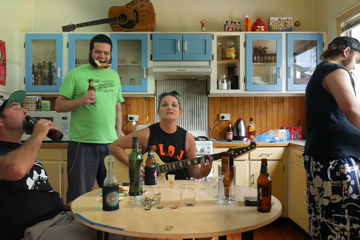 Jason Heerah
Jason HeerahWith recent television shows such as Go Back To Where You Came From and Joe Hildebrand's upcoming Dumb, Drunk & Racist, it's obvious that a serious re-examination of this country's appalling xenophobia is very much in the zeitgeist and, in this writer's humble opinion, not a moment too soon either. But what does this have to do with music, I hear you asking? And fair enough, too. But consider the Emerge Festival, brought to us over two glorious months by Multicultural Arts Victoria, in which refugee and emerging artists showcase the dazzling array of talents they have enriched this country with, and it's not hard to make the slight leap that – besides being an out-and-out hoot – Emerge 2012 is also a profoundly important political and cultural happening in this time and place.
The festival's Main Event was a massive celebration held at Fitzroy Town Hall on Sunday, which saw Napier Street closed off for an all-day street party. Headlining the music bill was Ethiopian singer Bitsat Seyoum, already a well-established artist before she came to Australia four years ago. She's famous for both her traditional and popular music, as well as her 'wax and gold' – a traditional Ethiopian form of poetry characterised by double meanings. Although this is the second time she has performed at Emerge, Seyoum is still overjoyed to be bringing the songs of her old homeland to other parts of the world.
“I'm really happy,” she says. “There are a lot of people in Australia who don't know about me and the work I've done in Ethiopia. There are a lot of people who don't know much about Ethiopia. And this festival is a great chance to get some of that information out there. Some people don't understand about Ethiopia – they just know what they see on television – but we are singing, we have the culture, many different languages, many different cultures, much dancing. I want to teach people about what we are. Because I have this opportunity, I feel very lucky.”
Talking of Ethiopian culture, as well as learning about new things, wax and gold poetry is something this writer, for one, has no understanding of. Seyoum explains that, like a lot of poetry, it comes from a need for lovers to communicate better, and that the double meanings inherent in it serve a very particular purpose. “Sometimes in Ethiopia,” she continues, “if a man and a woman love each other, but they can't talk about it because of the woman's parents, for example, sometimes they will talk in wax and gold so that they can understand what they are saying but nobody else can. One lady, one day, she has a visit from a man, but the next day he doesn't come back. He is scared because she has a lot of brothers. So she can't say anything, but with wax and gold, she can speak to him and ask him why he didn't come back to her again. It's very popular in singing in my country. Also, you can listen to it many times before you get all the different meanings.”
Don't miss a beat with our FREE daily newsletter
Running until 31 July, there's no shortage of highlights in the Emerge Festival program. There is a Burundi film project screening and Independence Day celebrations at ACMI, a Refugee Week theatre performance of Hope In Settlement at 45 Downstairs and an exhibition of the works of two renowned Somali artists, Adam Jama Ganei and Abdiqadir Ahmed, at Fo Guang Yuan Art Gallery, just to name a few. And another great highlight will be Visible Music, which sees Electric Empire member Jason Heerah and his band, Laneway Funk, in a special collaboration with emerging artists, including Seyoum, who Heerah mentored as part of MAV's Visible Mentoring Program.
“I've been involved in the Visible Mentoring program for the last three years now,” Heerah says. “I've been a session musician for the last ten years now, so my name came up around the traps. Multicultural Arts got in contact with me and gave me a brief of what they were all about and I just thought I'd been kind of waiting for something like this as far as working on music goes. I just love African rhythms and Latin rhythms. And at least 50% of the artists in the program are from African backgrounds, so it's great. But I guess the really great thing is that it just gets the music out there and heard.”
When Heerah tells of working with Seyoum and blending their two wildly different sounds, it's a story of instant connections and profound musical adventurousness. “At the start of every year there's a producers meeting where we get to meet the artists involved, and that's where I met Bitsat last year,” Heerah continues. ”She's heard my music with Electric Empire, which is quite a kind of soul sound, and she wanted that sort of flavour with her music, and it just all seemed really organic. Blending the sounds was great, it was easy really. And I guess she was also after a fuller sound. And that formula's been working.”
Seyoum agrees that it was a worthwhile partnering, even going so far as to indicate familial relations. And while this is the first time they'll be appearing on stage together, Seyoum isn't worried that the collaboration won't work well. “When I first met Jason, I felt like he was my brother,” she says. “So I was so happy. When we worked, he never said he was tired. He always wanted to work. They gave me a choice of another person, but I wanted to work with Jason. He would always call me, try to change my music for the better. I saw a lot of young singers in Ethiopia trying to make more Western music, and this is something I wanted to do as well. When I got to work with Jason, this is what happened. This is my first time getting up on stage together with Jason and another group, but Jason is very happy, so I think it will work well.”
And did Heerah find that the hoary old cliché turned out to be true, namely that teachers (mentors) learn more from their students than the students learn from them? “Absolutely,” he says. “This is the first time I've tackled any music from Ethiopia, so I was learning all sorts of things. As much as I was producing/mentoring, I was also learning about rhythms and what goes where. It was good.”
Which kind of fits nicely with the whole idea of world music in general, doesn't it? Not to mention the Emerge Festival in particular: that part of the pleasure is hearing sounds one has no idea existed? From cultures one is at least partly ignorant of? “That's right,” he says. “There's probably more stuff out there than you and I have any clue about. It's fantastic.”















